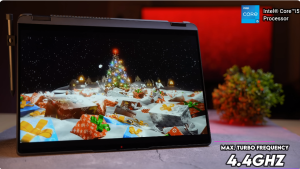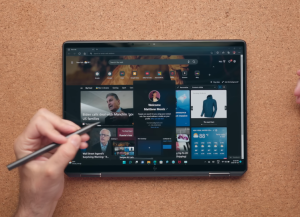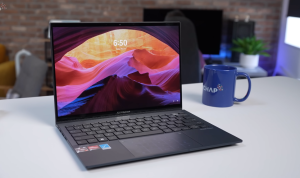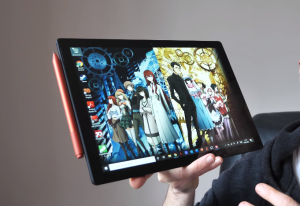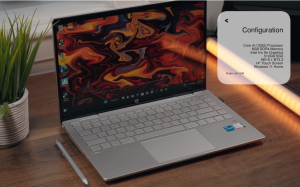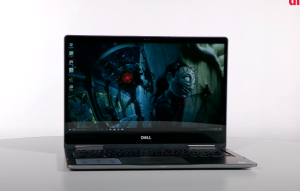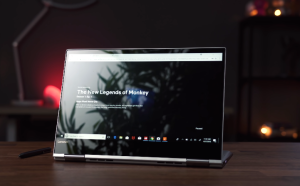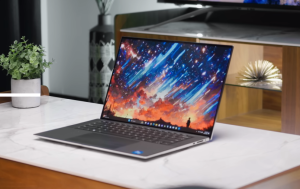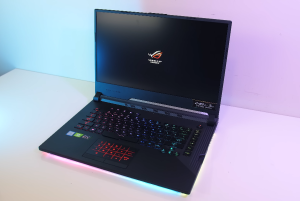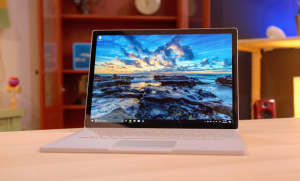Last Updated on 19/09/2023 by Dolly
Over the last few years, the 2-in-1 form factor has grown into its own. There’s no need to stick with a clamshell when a 2-in-1 will suit the demands of all but the most demanding users in terms of pure performance.
We’ve tested every fantastic 2-in-1 available on the market, including Chromebooks, convertibles, and powerful 15-inch models. The ThinkPad X12 Detachable is the greatest 2-in-1 right now, thanks to its amazing keyboard, which is as effortless to remove as it is to type on. It’s as excellent as a laptop as it is a tablet, making it the greatest overall 2-in-1.
Why Choose a 2-in-1 Laptop?
One of the primary reasons to select a 2-in-1 over a regular laptop or tablet is to limit the number of electronic devices you utilize. You almost certainly carry a smartphone with you at all times. You most likely also have a standard laptop that you use at work and/or at home. You could still have a traditional desktop computer. YOu are reADING Top 10 Best 2 in 1 Laptops for Gaming. Perhaps you have a tablet that you use at night to surf the web or play games while relaxing on the couch. It’s not uncommon for folks to have three, four, or more electronic gadgets that they utilize for the same duties.
A touchscreen laptop makes it simple to reduce your device count to one or two. You will almost certainly always have a smartphone, but with a PC operating system, dedicated keyboard, more RAM, a larger hard drive, and a touchscreen, you can use a convertible laptop for both works and play without losing the components that you require.
How is a 2-in-1 Different from a Laptop or Tablet?
Laptops have the usual bottom-mounted keyboard and top-mounted screen. They open and shut. They have several inputs/outputs, a CD/DVD player, additional memory, and other features. There’s basically nothing a regular laptop can’t do that a 2-in-1 at a comparable price range can’t. Some hybrid laptops are as light as a tablet yet have the capabilities of a laptop.
Tablets have a touchscreen, apps, are lightweight, include a charging port, a headphone jack, and have limited storage. Tablets are frequently limited in terms of the amount of real, genuine work that can be done on them, and much of this is due to the lack of a dedicated, ergonomic keyboard for typing.
In the tablet vs. hybrid laptop argument, some hybrid laptops weigh more than regular tablets. Hybrid laptops also run Windows and Chrome operating systems, which means they don’t have the extensive app store that Android and Apple do. If you don’t have a Windows or Google phone, you won’t be able to link your smartphone and 2-in-1.
Advantage of 2-in-1 laptop
- Thinner shape than a traditional laptop
- Touch pad and touchscreen allow you multiple ways to control the device
- Designated keyboard allows a more ergonomic typing experience
- Full-featured desktop operating system provides quicker response time and ability to do more tasks
- Input/output ports, such as USB and DisplayPort, allow you to easily attach peripherals.
Disadvantages of 2-in-1 laptop
- Sometimes sketchy interface between screen and keyboard
- Keyboard and screen are often smaller in size than those found on traditional laptops
- Mobile GPUs are not the most advanced available
- Heavier weight makes it less ideal to hold for long periods, if using as a tablet with touchscreen
- Higher price point since the cost is similar to a laptop, not a tablet
- Non-expandable storage space limits the amount of files you can save to the tablet
Flexible and Portable
Other benefits are provided by the form aspect of these gadgets. Convertibles may be set up in a tent or stand mode, which means the screen can be turned and twisted into various configurations, allowing business users to effortlessly share their displays with a larger group if necessary. Such users may also switch between preparing a presentation with the touchscreen interface and taking notes with the keyboard with ease. As a result, the versatility of these gadgets is unrivaled.
Detachable devices, on the other hand, provide users the option of detaching and transporting either the touchscreen or the full unit together with the keyboard, depending on their needs and convenience. This eliminates the need to carry extra weight, making these gadgets ultra-portable.
Furthermore, for those who live an extremely mobile lifestyle, having a 2-in-1 tablet provides the extra ease of carrying only one device with all the capabilities they may require. In addition, in certain devices, the base unit and the screen include separate batteries, resulting in longer total battery life when compared to a standard laptop. They also don’t have to carry several chargers and accessories, which adds to the device’s mobility.
Sleek and attractive design
When it comes to appearance and feel, these gadgets are sleeker and take up less space than a standard laptop. This enables users to utilize them even in confined situations, such as while seated on an airplane. They are also meant to be visually appealing, with metallic bodies and thin bezels. At the end of the day, a 2-in-1 tablet provides a more customized experience than any other gadget. You are free to utilize your laptop in any way you see fit. So, if you’re searching for a portable laptop, a 2-in-1 is a good option. There are several possibilities accessible, and you could just discover the one that fits your style, necessity, and even price.
Top 10 Best 2 in 1 Laptop for Gaming
1. Lenovo IdeaPad Flex 5
The list begins with Lenovo’s most recent release, the IdeaPad Flex 5. This is now one of the best all-rounders available in India. This provides incredible value for money and is our top option for those who work from home.
The design is high-end and elegant. The laptop has a hinge mechanism that allows you to use it in whatever position you wish – laptop, tablet, or tent mode. The display is good for indoor use, but it is quite reflecting outside, and the 250nits brightness makes it difficult to see the content.
On the inside, it is powered by a Ryzen 5 4500U processor, making it one of only a handful of laptops in the segment to have the chipset. The sheer CPU performance easily outperforms the competition. Because of the convertible form factor, you can instantly go from work to entertainment mode. A privacy shutter, fingerprint scanner, front-firing speakers, and rapid charging are also included.
The Lenovo Flex 5 performs admirably as a gadget designed to provide long-lasting, steady performance. It outperforms its Intel equivalents by a wide amount. And, as a machine for work or watching movies or TV shows, the Lenovo Flex 5 will not disappoint.
The Lenovo IdeaPad Flex 5 is powered by an AMD Ryzen 5 4500U processor, making it one of the cheapest laptops in India with a Ryzen 5 4000 series chipset. It has six cores and a base clock speed of 2.3GHz with a turbo clock speed of up to 4GHz. Onboard graphics are handled by an AMD Radeon R5 GPU, which is adequate for light to medium applications.
The Lenovo IdeaPad Flex 5 comes with 8GB of Soldered DDR4-3200Mhz RAM. It does, however, support up to 16GB of RAM. It also includes a 512GB M.2 PCIe NVMe SSD that cannot be extended.
The laptop’s day-to-day functioning was seamless and enjoyable. There was no latency or freezing of the screen at any time. My usage includes at least 15 chrome tabs, which included Google Docs, Sheets, the Slack Application, a bit of Photoshop, attending a handful of meetings, and downloading and playing a few photographs and videos online. I had no trouble accomplishing any of these things when using the Lenovo IdeaPad Flex 5.
SPECIFICATIONS
- Screen: 14-inch Full HD (touch-screen)
- CPU: AMD Ryzen 5 4500U
- Graphics: AMD Radeon 7
- RAM: 8GB
- Storage: 1TB SSD
- Weight: 1.5Kg
Pros
- Excellent performance
- Insane battery life
- Comfortable keyboard
- In-box stylus
Cons
- Display not bright enough
- Buggy in tablet mode
2. HP Spectre x360 13
The HP Spectre x360 holds its own against anything Apple has to offer, thanks to an improved keyboard, a stylus included in the box, superb speakers, and a stunning touchscreen. In fact, some of the features were inspired by Apple’s design.
The four-speaker setup, similar to the iPad Pro, delivers user-facing sound regardless of position. Meanwhile, the new x360 features dual USB-C connectors for speedier charging and data transfer. Does this sound familiar? At the same time, none of this detracts from the battery life, which exceeds eight hours of continuous use.
Furthermore, for a modest premium, the HP Spectre x360 can now be configured with a 4K screen and 1TB of SSD storage, making it even more deserving of the top slot on our list.
The HP Spectre x360 (2020) eats up everyday work duties with ease thanks to Intel’s 10th-generation laptop CPUs, which are paired with a substantial 16GB of high-speed RAM. On the HP Spectre x360, web browsing, streaming films, and utilizing the Microsoft Office software suite are all smooth and simple.
Of course, this 2-in-1 isn’t content with that. Because of the increased memory and new, more powerful processor, more sophisticated activities like rendering and video encoding are more feasible here. However, if you frequently work with high-intensity software, you may prefer a system with a more powerful graphics solution.
In our tests, the Iris Plus graphics outperformed prior integrated graphics, scoring higher in our graphical tests than previous models. Our Cinebench rendering benchmark performance wasn’t quite as spectacular, but it was still adequate for a lightweight laptop.
Gaming on the HP Spectre x360 (2020) is also an option, albeit at the more casual end of the spectrum. Recent triple-A releases are unlikely to run smoothly without drastically lowering the resolution and graphical quality, but slightly older games or titles with low-demand graphics should work nicely. We played Tomb Raider and the superb indie gem FTL: Faster Than Light, both of which performed well at 1080p.
The HP Spectre x360 boasts some incorporated capabilities that all fit under one umbrella: privacy. This is the ideal laptop for anyone concerned about the risks of having an online presence, with a slew of features meant to keep you and your data safe.
The first is a now-common laptop feature, Windows Hello. You can log into your laptop with your face using an IR camera array attached to the x360’s HD webcam, even in low-light settings (for example, when you’re cuddled up in bed attempting to watch Netflix).
The camera kill switch comes next, a hardware switch on the laptop’s side that manually disables power to the webcam for increased protection. If you don’t want to utilize Windows Hello, there’s also a fingerprint scanner immediately below the keyboard that allows you to log in swiftly.
SPECIFICATIONS
- CPU: Intel Core i5 – i7
- Graphics: Intel HD Graphics 620
- RAM: 8GB – 16GB
- Screen: 13.3-inch, FHD (1,920 x 1,080) – UHD (3,840 x 2,160) IPS UWVA-backlit multi-touch
- Storage: 360GB – 512GB PCIe SSD
Pros
- Ultra-thin and light styling
- Snappy keyboard
Cons
- Lacks SD card reader
- Especially thick bottom bezel
3. Asus ZenBook Flip 14
The Asus ZenBook Flip 14 is one of the most powerful 2-in-1 laptops when it comes to day-to-day operations, thanks to its AMD Ryzen 7-3700U chipset. It has 8GB of RAM and a PCIe Gen3x2 NVMe 512GB M.2 SSD, which appears to be fairly standard for a 2-in-1.
This has one of the greatest displays on the list. It has a 14-inch LED panel with Full HD resolution and a narrow bezel with a 90% screen-to-body ratio, as well as a wide 100 percent sRGB color gamut and a 178° viewing angle. The 42WHrs 3-cell battery may provide up to 9 hours of battery life. However, at a weight of 1.6Kg, the laptop may feel a little heavy.
On our synthetic benchmark tests, our review unit of the ZenBook Flip 14 received average results. The review device received 3350 points on PCMark 8’s Accelerated Creative test, which is a few hundred points lower than the Lenovo IdeaPad C340’s score. To recap, the IdeaPad C340 we tested was powered by an Intel 8th Gen Core i5 CPU, an Nvidia GeForce MX230 GPU, 8GB of RAM, and a 512GB PCIe NVMe solid-state drive. The ZenBook Flip 14 scored 2340 and 13114 points in 3DMark’s Fire Strike and Cloud Gate tests, respectively. The latter result is actually substantially higher than the IdeaPad C340, which does have a dedicated graphics card.
The Ryzen-5-powered ZenBook 14 (UM431) performed admirably in our everyday performance testing, while the Ryzen 7-powered ZenBook Flip 14 follows suit. Our review unit performed multitasking on multiple programs across many virtual desktops with no latency or stuttering. During a typical workday, apps like Outlook, Word, Excel, Chrome, Photos, OneNote, File Explorer, and WhatsApp for PC opened and restored without a hitch. Furthermore, I didn’t notice a single stutter in the animation while switching between windows or desktops. Background music and videos were also played on various websites without incident. In conclusion, the Asus ZenBook Flip 14 is an excellent computer for general computing work.
SPECIFICATIONS
- Screen: 14-inch FHD IPS
- CPU: AMD Ryzen 7-3700U
- Graphics: RadeonRX Vega 10
- RAM: 8GB
- Storage: 512GB SSD
Pros
- Excellent performance
- Good display
- In-box Stylus Pen
Cons
- Audio output too low
- Slightly heavy
4. Microsoft Surface Pro 7
We had hoped that the Surface Pro 7 would have addressed all of the difficulties that plagued the Surface Pro 6 when it was first announced. However, its successor does not do much to right the ship. This was the ideal opportunity to bring the product line back on track, but the upgrade falls short where it counts.
That’s not to imply there aren’t any improvements to be made. The Surface Pro 7 includes the increasingly crucial USB-C connection, as well as several new components. However, there isn’t much else to suggest this tablet unless you want to continue with the Surface Pro line and have an outdated model. In fact, if you’re willing to invest the extra money, the current Surface Pro 8 model is the superior machine.
As with the Surface Laptop 4, this demonstrates that when Microsoft puts in the effort, it can still produce excellent portables. It’s just that the Microsoft Surface Pro 7 falls short of expectations. If you’re on a tight budget, you might be able to get it at a fair price now that a newer model is available.
Surface Pro 7, Microsoft’s latest Surface Pro in India, is a premium 2-in-1 laptop. It is available in four distinct configurations, with up to a 10th-generation Intel Core i7-1065G7 Processor, 16GB RAM, and 256GB SSD. The manufacturer says that the machine can run for up to 10.5 hours on a single charge and has fast charging capabilities. It weighs less than 800 grams.
Surface Pro 7 has three USB Type-A, one USB Type-C, and one Surface Connect port for connecting to displays and docking stations. The integrated kickstand aids in converting the Surface Pro 7 from a laptop to a tablet. It has an 8MP rear camera and a 5MP front camera that supports Windows Hello facial authentication.
Microsoft may have finally introduced a USB-C port, but the Surface Pro 7 design has remained unchanged from last year’s model. The device is still 11.5 x 7.9 x 0.33 inches (292 x 201 x 8.5mm) in size and weighs 1.7 pounds (770g). The tablet is still available in matte black and silver metal finishes.
The tablet’s touchscreen is still 12.3 inches diagonally, with a resolution of 2,736 x 1,824 (267 pixels per inch) and a 3:2 aspect ratio. It has the same sharpness, vibrancy, and responsiveness to touch as the previous version, which was already extremely outstanding. However, this specification hasn’t been updated in years and may benefit from an update, at least in terms of features like HDR and better color gamut coverage. Furthermore, the bezels are unusually thick for a tablet at this price in 2019.
After releasing essentially the same tablet for the past two years, it’s evident that either Microsoft has reached its limits with the original Surface Pro design, which is improbable, or the corporation is just no longer interested in tweaking the Surface Pro – save for the Pro X.
Instead, it appears that Microsoft is significantly more motivated by its planned dual-screen devices, which, depending on their performance, may likely herald the future of the company’s hardware design.
In terms of the most significant Surface Pro 7 design change, we finally get USB-C, but it’s on the USB 3.1 standard rather than Thunderbolt 3. This gives you the versatility of the new connection without the raw throughput of Thunderbolt 3 technology.
Thunderbolt 3 has been extensively accepted by Apple and countless other competitors at similar price points, making its absence in the Surface Pro 7 all the more noticeable. While Apple did not include it in the iPad Pro, it did include it in the similarly priced 13-inch MacBook Pro.
Microsoft has now enhanced the device’s studio microphones for more accuracy when using Cortana with your voice, although it’s such a modest enhancement that it’s barely worth mentioning.
However, to Microsoft’s advantage, the Type Cover keyboard now has deeper-feeling travel and a bouncy feel when our fingertips leave the keys. This is unquestionably an advance, but it will undoubtedly be an adjustment for long-time Surface Pro users — at least for a few minutes. Meanwhile, the Type Cover’s touchpad remains the same, and it is as smooth and responsive to touch as it has always been.
We especially like the return of the Alcantara fabric with this Type Cover, which appears and feels more densely woven than previously. As Microsoft asserts, this should make the fabric more stain-resistant.
Overall, this is the same Surface Pro you’ve known for years, with the addition of a more versatile USB-C port in place of a DisplayPort connection. Why not ditch the original USB-A in favor of another USB-C? Who can say? There is a lot that might have been done to improve this device at the same price that just wasn’t done, so pardon us for being underwhelmed by the appearance and feel of the Surface Pro 7.
SPECIFICATIONS
- CPU: : Intel Core i3/i5/i7, 10th gen
- Graphics: Intel UHD Graphics/ Intel Iris Plus
- RAM: 4/8GB/16GB
- Screen: 12.3-inch, 2,736 x 1,824 PixelSense display
- Storage: 128GB/256GB SSD
Pros
- Vastly improved performance
- USB-C finally
- Now with Wi-Fi 6
Cons
- Overall loss in battery life
5. HP Pavilion x360
The touch-enabled HP Pavilion x360 comes with a two-button inking pen. It also includes Amazon’s Alexa voice assistant. The 2-in-1 has hybrid storage, 256GB SSD, and 1TB HDD, and weighs 1.59 kg.
The machine’s I/O choices include two USB 3.1 ports, one Type-A port, one USB Type C port, an HDMI port, and an SD card reader. B&O Play Audio and HP Audio Boost are incorporated for audio.
The Pavilion x360 15 starts at $699.99 and features a 15.6-inch touch screen with a paltry 1,366-by-768-pixel resolution. Fortunately, our test unit included a 1,920-by-1,080 touch panel, a Core i3-1125G4 processor with Intel UHD integrated graphics, 8GB of RAM, and a 256GB NVMe solid-state drive. Core i5 and Core i7 processors are available, as are 12GB or 16GB of memory and SSDs with capacities up to 1TB.
Bluetooth and 802.11ac Wi-Fi are included (Wi-Fi 6 is an extra $10), as is Windows 10 Home and a stylus pen in the Pavilion’s silver color scheme. There’s no fingerprint scanner or face-recognition webcam, so you’ll have to type passwords rather than use Windows Hello, but the keyboard is backlit, which isn’t usually the case with budget devices.
In tablet mode, convertibles with 15-inch screens are all ungainly and heavy; it’s the inevitable effect of placing a 360-degree hinge on a desktop replacement. The HP measures 0.81 by 14.1 by 9 inches, which is around the same as the Dell Inspiron 15 7000 2-in-1 (0.71 by 14 by 9.4 inches) and the Lenovo Yoga C740 (0.71 by 14 by 9.4 inches) (0.72 by 14.1 by 9.3 inches). It’s a few ounces lighter, at 3.97 pounds, than they are, at 4.2 pounds each. When you squeeze the keyboard deck, there is some flex, but none when you hold the screen corners.
On the left side of the laptop, there is an HDMI video output, an audio jack, and a USB 3.1 Type-C (10Gbps) connector. On the right edge, two USB 3.1 Type-A (5Gbps) ports are joined by a microSD card slot and an AC adapter connector. Dell outperforms the HP with a Thunderbolt 4 port and a Core i5 versus Core i3 CPU for a few dollars less, however as you can see from our performance benchmarks, the Pavilion came close.
I compared the Pavilion x360 to four different convertibles for our benchmark charts. The Lenovo Yoga C740 and Dell Inspiron 15 7000 2-in-1 both have 15.6-inch displays, while the Asus VivoBook Flip 14 and Editors’ Choice award-winning Lenovo IdeaPad Flex 5 14 have smaller displays. The IdeaPad costs $600, while the Yoga costs $1,100.
PCMark 10 and 8 are comprehensive performance suites created by UL’s PC benchmark specialists (formerly Futuremark). We conduct the PCMark 10 test to replicate several real-world productivity and content-creation workflows. It is used to evaluate overall system performance for office-related operations like word processing, spreadsheet work, online surfing, and videoconferencing. Meanwhile, PCMark 8 contains a Storage subtest that we utilize to evaluate the speed of the system’s boot disk. Both generate a proprietary numeric score, with larger numbers being preferable.
HP finished last in this competition, but it surpassed the 4,000-point threshold, which suggests good productivity for Microsoft Office or Google Docs. The SSDs in all five laptops performed admirably in PCMark 8’s storage test.
Following that is Maxon’s CPU-intensive Cinebench R15 test, which is fully threaded to utilize all available processor cores and threads. To produce a complicated image, Cinebench prioritizes the CPU above the GPU. As a consequence, a proprietary score is generated that indicates a PC’s appropriateness for processor-intensive workloads.
SPECIFICATIONS
- CPU: Intel i3-10110U, 10th gen
- Graphics: Intel UHD Graphics
- RAM: 4GB
- Screen: 14-inch, 3,920 x 1,080 display
- Storage: 1TB HDD + 256 SSD
Pros
- Performance
- Audio
Cons
- Dull display
- Average battery life
6. Dell Inspiron 7373
The 7000 series is well-known for its high build quality. The Inspiron 7373 here has an all-aluminum shell on both the front and rear, which feels nice to the touch and appears to be pretty strong. It is without a doubt one of the better-built laptops at its pricing. However, don’t expect build quality to be on par with Dell’s XPS lineup, which is still a step up. An aluminum casing also lowers the likelihood of flex, so if you are a heavy-handed typist, you will be relieved to know that the keyboard deck has no flex. The same can be said for the display, which, in addition to having an aluminum cover, has a glass front and exhibits no bend under normal torsional stress. However, we believe Dell might have improved the design by extending the bottom bezels all the way to the hinges. Furthermore, the edges around the keyboard deck are fairly sharp and scrape into your wrists after extended periods of typing. Overall, we are pleased with the build quality of the laptop, and the battery indicator on the lid is a really pleasant touch.
Opening the back cover reveals the system configuration, which includes a 38Wh battery that is large in size but not capacity. The two speakers are located on either side of the battery, while the processor is cooled by a single blower-style cooler. Only the 512GB SSD SATA drive is user-replaceable, while the RAM is soldered to the motherboard. However, opening this laptop in the first place is difficult, and even if you do, you will void its guarantee.
Inside, you’ll find the most recent Intel Core i7-8550U processor. This is the most recent top-of-the-line 8th generation Intel processor for non-gaming laptops. Until the 7th generation, all CPUs were dual-core, but with the 8th generation, Intel is finally introducing a quad-core configuration in its U-series product selection. This gives these new-generation processors and the machines they power a significant performance advantage over their predecessors. This powerful microprocessor is combined with a dual-channel 16GB RAM kit, which is sufficient for practically all tasks that this processor is capable of doing. The 512GB M.2 SSD storage is simply a SATA drive, thus it will perform significantly slower than PCIe-based SSDs, which are quickly becoming a typical specification among thin and light laptops. In fact, this SK Hynix SSD is one of the slowest we’ve encountered on a tiny and light SSD in recent times.
If you only use the laptop for office work or browsing the web, there is no heating issue, although it does become a touch warm above the keyboard. It wasn’t until we pushed the computer to its limits with Prime95 that we noticed the heat on the bottom panel became uncomfortable. The numeric keypad gets hot as well, but if you’re working at a desk, this shouldn’t be an issue. However, we would not recommend using the PC on your lap while performing any processor-intensive tasks.
The music output from the twin speakers is pretty loud, however, at higher volumes, it crackles. The audio quality seems to be adequate, and while it lacks correct bass, you can still listen to music.
Aside from that, the Inspiron 7373 lacks a fingerprint scanner in favor of a Windows Hello-enabled camera that only works at random and in ideal lighting circumstances.
SPECIFICATIONS
- CPU: Intel Core i5-8250U, 8th gen
- Graphics: Intel UHD Graphics 620
- RAM: 8GB
- Screen: 13.5-inch Full HD display
- Storage: 256GB SSD
Pros
- Performance
Cons
- Battery life
7. Lenovo Yoga 730
Lenovo’s flagship Yoga 730 has a great 13.3-inch Full HD display with touch capability. It also includes a Bluetooth-enabled Active Pen 2 pen. It weighs only 1.12 kg and can power up to five houses on a single charge with intensive usage. It also offers quick charging.
There are just two Thunderbolt 3 USB Type-C connectors available. The Lenovo Yoga 730 achieves a good blend of performance and portability. It also includes a decent keyboard and touchpad combination.
In terms of performance, the Lenovo Yoga 730 is only a sixer. The review unit not only performed wonderfully in our benchmark testing, but it also proved to be suitable for everyday use. The review device came with an Intel Core i7-8550U CPU, 8GB of RAM, and an Intel UHD Graphics 620 GPU integrated. A Hynix 512GB PCIe NVMe SSD was used for storage. Going through the BIOS panels indicated that there were two RAM slots available within the system. This is encouraging news for people who intend to upgrade beyond 8GB in the future.
The Yoga 730 scored 159 points higher than the third-generation ThinkPad X1 Yoga and 303 points higher than the HP Pavilion x360 in PCMark 8’s Accelerated Creative test. It was the same story with 3DMark’s Fire Strike and Ice Storm Extreme graphics benchmark tests. The Yoga 730 received a chart-topping score of 5053 in PCMark 8’s Conventional Storage test, thanks to its smart Core i7 CPU and snappy Hynix SSD.
The Yoga 730 worked brilliantly in real-world circumstances as well. When I had over a dozen applications open at the same time, the convertible laptop exhibited no signs of slowing down or freezing. I was able to maintain around thirty Chrome tabs open at the same time (with one tab always blaring music on YouTube), multiple Word documents, WhatsApp for PC, iTunes, WordWeb, multiple instances of File Explorer, and a few other light applications like Sticky Notes open.
I was able to switch between these applications across three virtual desktops with ease, and the Yoga 730 did not break a sweat. There were times when the animation while changing windows slowed down by a few milliseconds, but I chalked that up to the Yoga 730’s lack of a dedicated GPU.
The Yoga 730 keeps the heat at bay for the most part. However, there are times when the quad-core Core i7 gets overheated, such as while installing apps or browsing with more than twenty Chrome tabs. At these times, the laptop’s base becomes rather heated. But that’s okay since you can’t feel it. The keyboard area, on the other hand, transmits enough heat through the area between the keycaps to make typing and resting your fingers uncomfortable.
When compared to the HP Pavilion x360 and the Lenovo ThinkPad X1 Yoga, the Lenovo Yoga 730 falls somewhere in the middle, but it performs more like the ThinkPad X1 Yoga, thanks to its competent processor and slick solid-state drive. All things considered, the Yoga 730’s performance is right up there.
SPECIFICATIONS
- Screen: 13.3-inch, FHD
- CPU: Intel Core i7, 8th gen
- Graphics: Intel Graphics
- RAM: 8GB
- Storage: 512GB SSD
Pros
- Display
- Performance
Cons
- Limited ports selection
8. Dell Precision 7530
The Dell Precision 7530 mobile workstation is a true beast. There is a wide selection of strong CPU options available that rival any of its competitors, but it is the GPU that truly distinguishes it.
The NVIDIA Quadro P3200 has a large quantity of VRAM and is capable of handling all forms of video editing.
It’s a very customizable laptop, with a variety of bespoke options for CPU, GPU, RAM, and storage. If you want the best that this laptop has to offer, you’ll have to pay an eye-watering $9343.57, so it’s not a cheap option.
The Precision 7530 also has an astonishing 11 ports, so you won’t be lacking in connectivity.
One disadvantage of this laptop is its extremely low battery life and its heavyweight of 5.75 pounds. However, if you want a powerful laptop that can handle many heavy jobs rapidly, the Precision 7530 is the way to go.
Specification
- CPU: Core i5-8300H-Core i9-8950HK
- Graphics: AMD Radeon Pro WX 4150-NVIDIA Quadro P3200 (6GB GDDR5)
- RAM: 8-64GB
- Screen: 15.6”
- Storage: 256GB-2TB
- Battery: 2-5 hours
- Ports: 2x USB 3.1, 2x USB-C (Thunderbolt 3), an SD card reader, Mini DisplayPort, HDMI port, RJ45 Ethernet port, security lock slot, headphone jack and optional smartcard reader
- Weight: 5.75 pounds
- Price: $1129-9343
9. Asus ROG Strix SCAR III
While the ROG Strix SCAR III screams gaming laptop, it’s also an excellent graphic design laptop.
It’s a big, hefty thing, but what it lacks in maneuverability it makes up for in power and speed. It can easily navigate any design app in the Adobe suite.
It does feature the normal gaming laptop drawbacks, such as short battery life at high brightness settings and a noisy fan.
This laptop’s display is well-lit, and colors will appear vibrantly. If you want to make designs that stand out on your screen, the Asus ROG Strix SCAR III is a good option.
Specification
CPU: Intel Core i9-9880H, octa-core, 2.3GHz-4.8GHz, 9th Gen- Graphics: Nvidia GeForce RTX 2070
- RAM: 32GB
- Screen: 15.6”
- Storage: 1TB SSD
- Battery: 1-5 hours
- Ports: 1x USB Type-C 3.1 (DisplayPort), 3x USB Type-A 3.1, 3.5mm combo audio jack, HDMI 2.0b, RJ45 Ethernet jack, Keystone
- Weight: 5.12 pounds
- Price: $1614-2459
10. Microsoft Surface Book 2
The Microsoft Surface Book 2 is still as powerful today as it was when it was first debuted in 2017. Few 2-in-1 laptops even come close to the Surface Book 2. The removable screen makes it as pleasant to use as a tablet as it is as a laptop. As a result, you can work from your workplace, at home, or on the go.
It feels natural to draw on the tablet with a pen. There is no time lag between when your pen touches the screen and when your illustration appears on it. When using a touchscreen pen, graphic artists have greater creative freedom than ever before. The screen resolution is sharp and clear, and the presentation of text, photos, and videos is flawless.
The Surface Book 2 doesn’t come cheap and, depending on the model you choose, it could end up costing you between $1049 and $2999.
Despite Microsoft’s claims that the Surface Book 2 will last 17 hours, the reality is closer to 7-13 hours, depending on the software. Overall, this laptop is a fantastic machine and one of the best options for graphic design.
Conclusion
When purchasing a convertible gaming laptop, there are several factors to consider. Starting with the price, most 2 in 1 laptops are pricey due to their portability, lightness, and, of course, technology. Second, for the graphics card, you can expect an NVIDIA GTX 1050Ti that can support all of the current titles with an FHD resolution.
You May Like These:-

